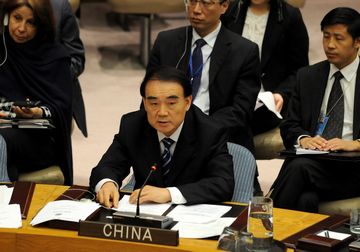| Statement by Ambassador Li Baodong at Security Council Open Debate on Protection of Civilians in Armed Conflict |
| 2011-11-09 11:49 |
|
Mr. President, I once again congratulate Portugal on assuming presidency of the Security Council this month and thank Mr. President for hosting today's open debate. I thank Secretary-General Ban Ki-moon for his statement. I have also listened attentively to the statements made by UN High Commissioner for Human Rights Madam Pillay, ASG of OCHA Madam Bragg and Mr. Philip Spoerri of the International Committee of the Red Cross. Mr. President, Over the past few years, the Security Council has held many open debates on protection of civilians in armed conflict. Parties concerned have reached extensive consensus, but remain divided over some issues. The recent experience of the Security Council, in particular, has triggered a new round of debate and reflection in the international community. The meeting initiated by Portugal today is no doubt very timely and important. I highly appreciate the effort. It is imperative for the Security Council to engage in a thorough reflection and full discussion on the issue of protecting civilians in armed conflict. It is also necessary to take the views of non-Council members seriously to act in a way that better represents the will of all UN Member States. Mr. President, 1. Protection of civilians is first and foremost the responsibility of the relevant government and the parties involved in the conflict. Civilians are the biggest and most direct victims of wars.Serious violence against civilians in armed conflict is unacceptable. Life is the most precious. Innocent civilians, especially women and children, in armed conflict must be effectively protected. In this connection, the government should shoulder the primary responsibility. Other parties involved in the conflict or those who step in, either domestic or external forces, are also duty bound. They must abide by the international humanitarian law and other related international laws, and fulfill their obligations to protect civilians. 2. The purposes and principles of the UN Charter must be honored. Action to protect civilians must comply with the purposes and principles of the UN Charter, especially the principle of respecting the sovereignty, unity and territorial integrity of countries and the principle of non-interference in other countries' internal affairs. The action must have the authorization of the Security Council and be taken in an orderly manner under the UN framework. The relevant action should focus on pushing for early realization of ceasefire, resolving conflicts and disputes through dialogue, negotiations and other political means, and supporting the role of good offices and mediation efforts by the related parties, including regional organizations and the UN Secretary-General, rather than the other way around. 3. Protection of civilians through use of force should be authorized with extreme caution. China always stands for peaceful settlement of conflict. No matter how advanced the weapons are, or how accurate the strikes may be, civilian casualties are just inevitable. It is proved by experience that Security Council action to protect civilians should go through serious and solemn discussion, and there should be stringent provisions on its authorization, implementing parties and implementing conditions. When there are still many questions to be clarified, and before the questions are answered, the Security Council should not take any hasty action. 4. Security Council resolutions should be fully and strictly implemented. Security Council resolutions must be implemented in full and to the letter. No party should willfully misinterpret the resolutions, let alone take action that is beyond the authorization of the Security Council. To protect civilians, can force be used in a large scale? Is there a need to bombard infrastructure and residential areas? Should casualties of women and children be tolerated? These are all legitimate concerns of the international community and questions that demand answers.Protection of civilians falls in the realm of humanitarianism. There should be no political motives or purposes involved, including regime change. In this sense, how to strictly and effectively monitor the implementation of Security Council resolutions has become an important and urgent issue. China welcomes the concept paper proposed by Brazil. We will seriously study it and actively support relevant discussion. 5. It is imperative to abandon the practice of selectivity and double standard. Many UN Member States have all along called on the Security Council to adhere to the principle of fairness and impartiality, and attach equal importance to all issues on the Security Council agenda involving protection of civilians, including the situations in the Gaza Strip, Somalia, Afghanistan and Iraq. China endorses this view. Selectivity or double standard will only undermine the role and authority of the Security Council. Thank you, Mr. President. |
| |||||||||||||
| |||||||||||||
